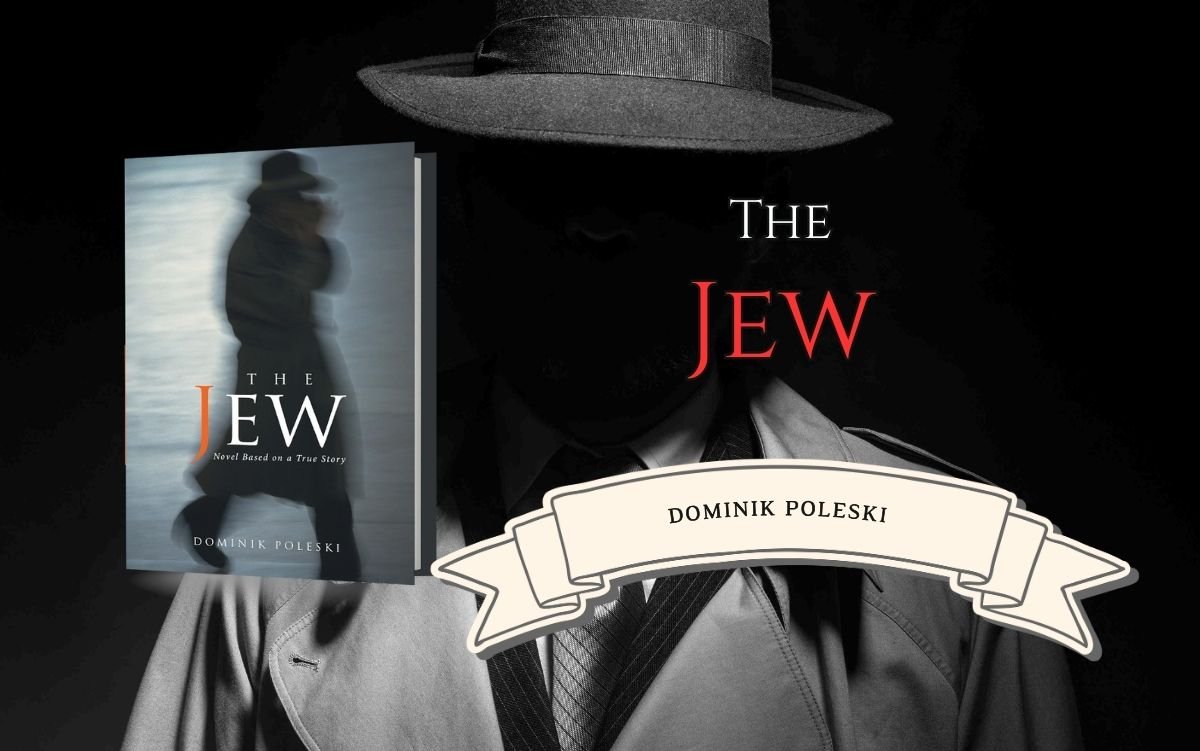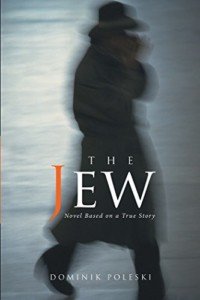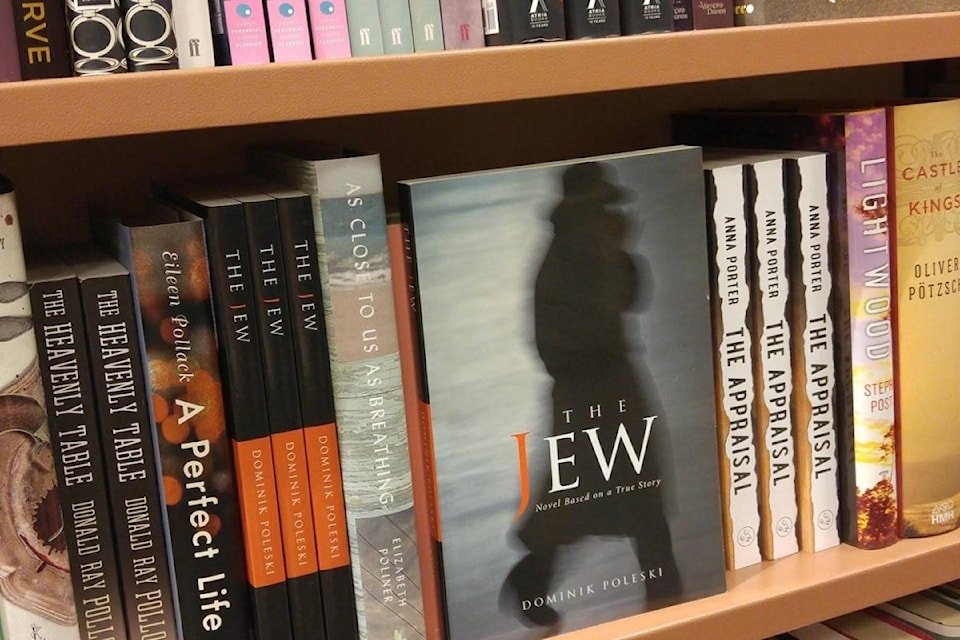Reviews
Hear what readers and critics are saying about Claudia Yeoh’s work.


BOOK INFORMATION:
Title: The Jew: Novel Based on a True Story
Author: Dominik Poleski
Genre: Historical Fiction Available on Amazon
Review date: Nov. 29, 2024
Resilience and empathy are like secret weapons for getting through life’s toughest moments. The
Jew: Novel Based on a True Story, set in 1960s Poland, is about Alek Brodski, a young Jewish
boy facing loss, prejudice, and the daily struggles of growing up in a world that often feels
unfair. It’s a story that feels incredibly relevant, especially as we see so many divisions in the
world. Alek’s life reminds us of the importance of human connection and staying hopeful, even
when life seems impossible.
The book is set in a small town near the Soviet border during a time when life was tough for almost everyone. Dominik Poleski does a great job of painting this world without overwhelming readers with too much detail. Instead, he focuses on the people—Alek, his hardworking but tired mother, and the complicated characters around them. One of the standout relationships in the book is between Alek and Ela, a classmate who’s struggling with her own problems, especially an abusive father. Their bond feels tender, showing how even a small connection can bring some comfort when everything else seems to fall apart.
Poleski also makes small, personal moments feel meaningful. For example, Alek’s baptism isn’t just a religious ceremony, it’s his attempt to belong somewhere and start fresh. Poleski captures the emotions of moments like these so well that you can’t help but feel for the characters. The details of the town—snow-covered streets, quiet houses, and eerie cemeteries—makes you almost feel the cold and see the flickering candlelight (mirroring the sadness and struggles of the people in the story.
The book is set in a small town near the Soviet border during a time when life was tough for almost everyone. Dominik Poleski does a great job of painting this world without overwhelming readers with too much detail. Instead, he focuses on the people—Alek, his hardworking but tired mother, and the complicated characters around them. One of the standout relationships in the book is between Alek and Ela, a classmate who’s struggling with her own problems, especially an abusive father. Their bond feels tender, showing how even a small connection can bring some comfort when everything else seems to fall apart.
Poleski also makes small, personal moments feel meaningful. For example, Alek’s baptism isn’t just a religious ceremony, it’s his attempt to belong somewhere and start fresh. Poleski captures the emotions of moments like these so well that you can’t help but feel for the characters. The details of the town—snow-covered streets, quiet houses, and eerie cemeteries—makes you almost feel the cold and see the flickering candlelight (mirroring the sadness and struggles of the people in the story.
I like that Alek isn’t portrayed as perfect. He doubts himself, struggles with guilt, and tries to
make sense of everything happening around him. This makes him relatable. His mother is a
symbol of quiet strength, while Ela shows strength despite the violence she faces at home. Even
the less likable characters, like the drunken Mr. Nowak or the overly strict Father Antoni, feel
real because they’re shown as complex, not just one-dimensional villains.
What’s surprising about The Jew is how much it feels connected to issues we see today. The discrimination Alek faces and the harsh conditions in his small town echo the challenges people still deal with, whether it’s prejudice, poverty, or feeling out of place. This makes the book not just a historical story but one that feels modern. It’s a reminder that no matter how hard life gets, empathy and perseverance are what help us move forward.
The Jew: Novel Based on a True Story is an emotional story about identity, belonging, and the depth of the human spirit. This is one that will stick with you because it’s so honest. The author’s skill at bringing xcharacters and themes to life within a specific time and place is what makes this book so powerful. It makes you think, feel, and reflect on your own life, and it’s hard to ask for more than that. – The Moving Words Review
What’s surprising about The Jew is how much it feels connected to issues we see today. The discrimination Alek faces and the harsh conditions in his small town echo the challenges people still deal with, whether it’s prejudice, poverty, or feeling out of place. This makes the book not just a historical story but one that feels modern. It’s a reminder that no matter how hard life gets, empathy and perseverance are what help us move forward.
The Jew: Novel Based on a True Story is an emotional story about identity, belonging, and the depth of the human spirit. This is one that will stick with you because it’s so honest. The author’s skill at bringing xcharacters and themes to life within a specific time and place is what makes this book so powerful. It makes you think, feel, and reflect on your own life, and it’s hard to ask for more than that. – The Moving Words Review

Title: The Jew: Novel Based on a True Story
Author: Dominik Poleski
Publisher: Xlibris
ISBN: 9781524583088
Pages: 252
Genre: Historical Fiction
Reviewed by: Dan Macintosh

Dominik Poleski’s story about growing up in a small town Poland in the 60s offers a smart and insightful window into a pivotal point in world history. Centered upon a troubled teenager Alek Brodski, Poleski sets his tale in Eastern Europe well after World War II, and also well before the Cold War’s end. With its rich detail, the reader walks away from this historical novel with a much better understanding of what it must have been like to be the only (known) Jewish family in a small Polish village. Alek forges a close bond with his mother Zofia, mostly because he doesn’t have anybody else to turn to. It’s not until he begins an unlikely relationship with the young prostitute Ela that he finally finds somebody outside of his family bloodline to befriend.
Escapism is one of the major themes running through Poleski’s book. One method Alek uses to attempt to escape his dark and desperate surroundings, for instance, involves taking walks through his village, peering into the first floor of neighborhood residences and imagining what their day-to-day lives might be like. Both Alek and his mom also attempt to migrate to Israel, in a manner of physical escape, after learning Poland might be loosening such emigration restrictions. Lastly, Alek escapes the isolation of being the lone Jew in town by converting to Catholicism, in hopes that an association with the church might finally bring he and his tightknit family the social life they so desperately need.
Although Poleski highlights his home country’s political situation throughout the story, this is not a strictly political work. Nevertheless, he paints a not too pretty picture of communism during this period. Even though it was idealistic, communism never fully delivered on its promises. Despite the Marxian belief that religion is the opiate of the people, the folks in Alek’s world are mostly deeply spiritual. Even before joining the church, Alek experiences deep spiritual doubts. The reader is also left to wonder if Alek’s conversion to Catholicism is truly sincere.
Poleski does a thorough job of creating detailed descriptions of the characters in his book. While the story is never less than compelling throughout, it’s these real life characters that leave the greatest lasting impression. This is also not one of those birth to death life stories. Poleski leaves off before Alek enters full adulthood, so much is left to the reader’s imagination regarding what happens next.
Escapism is one of the major themes running through Poleski’s book. One method Alek uses to attempt to escape his dark and desperate surroundings, for instance, involves taking walks through his village, peering into the first floor of neighborhood residences and imagining what their day-to-day lives might be like. Both Alek and his mom also attempt to migrate to Israel, in a manner of physical escape, after learning Poland might be loosening such emigration restrictions. Lastly, Alek escapes the isolation of being the lone Jew in town by converting to Catholicism, in hopes that an association with the church might finally bring he and his tightknit family the social life they so desperately need.
Although Poleski highlights his home country’s political situation throughout the story, this is not a strictly political work. Nevertheless, he paints a not too pretty picture of communism during this period. Even though it was idealistic, communism never fully delivered on its promises. Despite the Marxian belief that religion is the opiate of the people, the folks in Alek’s world are mostly deeply spiritual. Even before joining the church, Alek experiences deep spiritual doubts. The reader is also left to wonder if Alek’s conversion to Catholicism is truly sincere.
Poleski does a thorough job of creating detailed descriptions of the characters in his book. While the story is never less than compelling throughout, it’s these real life characters that leave the greatest lasting impression. This is also not one of those birth to death life stories. Poleski leaves off before Alek enters full adulthood, so much is left to the reader’s imagination regarding what happens next.
Akin to the best Russian literature of the past, Poleski brings us right smack dab in the middle of what is a fairly exotic lifestyle to most westerners. Even though this story is set in Poland, it describes a culture heavily influenced by the Soviet Union at that time. Through Alek’s eyes, we see a sad picture of many familial relationships. Most of the men drink too much, many physically and verbally abuse their wives and home is oftentimes the most dangerous place to be. The church doesn’t fare much better, as the town priest is portrayed as a womanizing, money-grabbing and untrustworthy spiritual guide.
While the story is many times dark, Alek’s character is this book’s most hopeful character. He’s smart, talented and willing to make life changes that improve his life. The reader hurts with him when he’s abused by town bullies, and then celebrates along with him when he begins his new spiritual journey. His mother Zofia is also admirable in her undying devotion to the welfare of her son.
As this work is based upon real observations Poleski made in his own life, this book is part biography, and part historical fiction. However, no matter how you want to label it, it is a book well with the time it takes to read it. It’s especially troubling to learn about post-World War II anti-Semitism (so soon after the Holocaust took so many Jewish lives, particularly Polish lives). Furthermore, such racism still plagues the world today, which may make you wonder if we’ll ever learn to simply live and let live. Excellently written and should be read by all generations.
While the story is many times dark, Alek’s character is this book’s most hopeful character. He’s smart, talented and willing to make life changes that improve his life. The reader hurts with him when he’s abused by town bullies, and then celebrates along with him when he begins his new spiritual journey. His mother Zofia is also admirable in her undying devotion to the welfare of her son.
As this work is based upon real observations Poleski made in his own life, this book is part biography, and part historical fiction. However, no matter how you want to label it, it is a book well with the time it takes to read it. It’s especially troubling to learn about post-World War II anti-Semitism (so soon after the Holocaust took so many Jewish lives, particularly Polish lives). Furthermore, such racism still plagues the world today, which may make you wonder if we’ll ever learn to simply live and let live. Excellently written and should be read by all generations.


Title: The Jew: Novel Based on a True Story
Author: Dominik Poleski
Publisher: Xlibris
Book review by: Barbara Bamberger Scott
“We are Jews, and always will be, and we don’t have it written on our foreheads, and we don’t behave differently than anybody else.”
Teenager Alek Brodski and his mother, the poor widow Zofia, live in a remote Polish village in the politically fraught 1960s. Everyone knows everyone else’s business and knows that the two are the only Jews in town. When Alex, a loner who tries to avoid trouble, is set upon and beaten up by three boys, Zofia seeks justice from the fanatical Marxist police chief who offers only lies and evasions. Kindly Christian Maria Pavloska, who witnessed the incident, begins to help and counsel Zofia. Alex, intelligent and artistically talented but tormented by adolescent fears and fantasies, meets Ela, a young prostitute, when she speaks out to defend him from yet another attack. Ela returns to high school in hopes of seeing Alek and getting his help to study and improve her miserable life. Meanwhile, Zofia, having failed to get permission to emigrate with Alek to Israel, takes advice from Maria to help her son gain the social acceptance that he’ll need to become successful wherever he chooses to live.
Dominik Poleski was raised in Poland in the crucial time frame of this atmospheric story. His book is both a novel about a teenage boy grappling with political and philosophical upheavals forced on his nation by uncaring systems and a fictionalized memoir of the author’s own desperation and heartache as a young man who personally experienced the brunt of those systems. As a storyteller, Poleski writes in a practiced manner, using clear but stylish prose. As a memoirist, he frankly shares the intensity of the pain he went through. He has skillfully created two plot devices that give the story of Alek a pleasant, almost mystical denouement: a religious conversion and a youthful romance. A well-written historical novel, Poleski’s tale will resonate with thoughtful, socially conscious readers.
Dominik Poleski was raised in Poland in the crucial time frame of this atmospheric story. His book is both a novel about a teenage boy grappling with political and philosophical upheavals forced on his nation by uncaring systems and a fictionalized memoir of the author’s own desperation and heartache as a young man who personally experienced the brunt of those systems. As a storyteller, Poleski writes in a practiced manner, using clear but stylish prose. As a memoirist, he frankly shares the intensity of the pain he went through. He has skillfully created two plot devices that give the story of Alek a pleasant, almost mystical denouement: a religious conversion and a youthful romance. A well-written historical novel, Poleski’s tale will resonate with thoughtful, socially conscious readers.
Title: Silent observer revisits harrowing scenes of his youth
Author: Dominik Poleski
Publisher: Xlibris
Reviewed by: Surrey Now-Leader

“Life is unfair, don’t we all know that?”
The words of a woman clerk in a regional passport office in Poland summarize the prevailing mood in The Jew, a first novel by Dominik Poleski (the nom de plume of South Surrey resident Tadeusz Chmielewski).
The author’s precise and detailed descriptive style documents – like the unblinking eye of a camera – the reality of a particular time and place, a small town in Poland, bordering on the then-Soviet Union, in the late 1960’s.
There, ordinary people must endure – as best they can – life under a communist totalitarian state. It’s a grim environment in which corruption and decay are everyday facts of life. In a depressed – or rather, ideologically repressed, economy – alcoholism, violence, prejudice and spousal abuse are usual outlets for the population’s overwhelming sense of despair.
The local police commandant takes kickbacks and seems uninterested in solving crimes; the influential Catholic priest is rumoured to be stashing collection money in his sofa; everyone is party to a black market trading goods across the border with Russia and no one seems to care that a teenager has quit high school to walk the streets with the town’s only other prostitute.
But the town is not immune from radical changes occurring in the world – widespread students’ protests in both the West and East, the invasion of a liberal-leaning Czechoslovakia by the Soviet Union, the assassination of Robert Kennedy and the Vietnam War – as spun by the conflicting voices of the state-run media and the clandestinely-heard Radio Free Europe.
In the town, but isolated by the anti-Semitic discrimination of other residents, live the community’s only Jews: protagonist Alek Brodski, a high school student, and his doting mother Zofia.
Determined to secure the best life possible for her son, Zofia attempts several ways to break the chains of their deadlocked existence, including leaving their native Poland to emigrate to Israel, and, ultimately, a more drastic, unexpected solution.
The Jew is a work of disarming subtlety, in which Poleski’s calmly analytical prose – he counts as influences Dostoevsky, Henry David Thoreau, Polish author Henryk Sienkiewicz, Hemingway and Graham Greene – suggests multiple layers of meaning as he exposes onion-like layers of hypocrisy, and even absurdity, in Polish society.
“It’s a book stripped down to the bone,” said the author, who by day works overseeing draft plans for a structural steel company. “I wanted no redundancy, no useless conversations – everything is there for a purpose.”
It’s also an immensely personal work, he says.
The reader first encounters Alek as the victim of a harrowing beating at the hands of three racist thugs, witnessed by a kindly old lady, Pavloska – one of the Brodskis’ few allies in town – and a 13-year-old boy.
The words of a woman clerk in a regional passport office in Poland summarize the prevailing mood in The Jew, a first novel by Dominik Poleski (the nom de plume of South Surrey resident Tadeusz Chmielewski).
The author’s precise and detailed descriptive style documents – like the unblinking eye of a camera – the reality of a particular time and place, a small town in Poland, bordering on the then-Soviet Union, in the late 1960’s.
There, ordinary people must endure – as best they can – life under a communist totalitarian state. It’s a grim environment in which corruption and decay are everyday facts of life. In a depressed – or rather, ideologically repressed, economy – alcoholism, violence, prejudice and spousal abuse are usual outlets for the population’s overwhelming sense of despair.
The local police commandant takes kickbacks and seems uninterested in solving crimes; the influential Catholic priest is rumoured to be stashing collection money in his sofa; everyone is party to a black market trading goods across the border with Russia and no one seems to care that a teenager has quit high school to walk the streets with the town’s only other prostitute.
But the town is not immune from radical changes occurring in the world – widespread students’ protests in both the West and East, the invasion of a liberal-leaning Czechoslovakia by the Soviet Union, the assassination of Robert Kennedy and the Vietnam War – as spun by the conflicting voices of the state-run media and the clandestinely-heard Radio Free Europe.
In the town, but isolated by the anti-Semitic discrimination of other residents, live the community’s only Jews: protagonist Alek Brodski, a high school student, and his doting mother Zofia.
Determined to secure the best life possible for her son, Zofia attempts several ways to break the chains of their deadlocked existence, including leaving their native Poland to emigrate to Israel, and, ultimately, a more drastic, unexpected solution.
The Jew is a work of disarming subtlety, in which Poleski’s calmly analytical prose – he counts as influences Dostoevsky, Henry David Thoreau, Polish author Henryk Sienkiewicz, Hemingway and Graham Greene – suggests multiple layers of meaning as he exposes onion-like layers of hypocrisy, and even absurdity, in Polish society.
“It’s a book stripped down to the bone,” said the author, who by day works overseeing draft plans for a structural steel company. “I wanted no redundancy, no useless conversations – everything is there for a purpose.”
It’s also an immensely personal work, he says.
The reader first encounters Alek as the victim of a harrowing beating at the hands of three racist thugs, witnessed by a kindly old lady, Pavloska – one of the Brodskis’ few allies in town – and a 13-year-old boy.
This silent observer, who recurs several times in the novel, is the author himself, Poleski admits.
“I wrote myself in as a character,” he said.
In what he describes as a “sad childhood” in the town of Terespol in Poland, he often wandered the streets alone at night. And he did witness the real-life beating of the man who became the inspiration for Alek.
“I’d see him and his mother,” he said. “I’ve seen the house where they lived. And for an inexplicable reason I happened to be there at some key points in his story.”
Poleski was virtually deserted – along with his two brothers – in his early teens by his parents, who fled the country (his father had attracted attention from the authorities for making money through a home wood-working business) and emigrated to Canada under the subterfuge of visiting relatives here.
That led to years of hardship as the brothers struggled to make ends meet and complete their education, with the help of relatives and neighbours, before they, too, could emigrate to Canada in the late 1970s.
But somehow over the years, the story of the real ‘Alek’ stuck with him to become a central piece in preserving his memories of the way things were in his youth – and survived several abortive attempts to translate his memories into a novel during the past nine years.
“I was always interested in the arts and literature as a way of escape,” he said.
Not a Jew himself, Poleski said he could not be indifferent to the suffering of others like ‘Alek’ and ‘Zofia’.
“Because I was bullied, I empathized with them. It resonated with me.”
“When he was beaten, when he collapsed against the wall, I was standing 30 metres away – the sounds coming out of him were just horrendous.”
“When he was beaten, when he collapsed against the wall, I was standing 30 metres away – the sounds coming out of him were just horrendous.”
Such scenes were common at a time when several thousand Jews were expelled from Poland “for subversion of the status quo,” he said.
The book is not unrelievedly grim, but Poleski does not repent the inclusion of some salty language, and shrugs off the criticism of some who have declared the book “sordid.”
“This is unvarnished – this is how it was,” Poleski said.
“I wrote myself in as a character,” he said.
In what he describes as a “sad childhood” in the town of Terespol in Poland, he often wandered the streets alone at night. And he did witness the real-life beating of the man who became the inspiration for Alek.
“I’d see him and his mother,” he said. “I’ve seen the house where they lived. And for an inexplicable reason I happened to be there at some key points in his story.”
Poleski was virtually deserted – along with his two brothers – in his early teens by his parents, who fled the country (his father had attracted attention from the authorities for making money through a home wood-working business) and emigrated to Canada under the subterfuge of visiting relatives here.
That led to years of hardship as the brothers struggled to make ends meet and complete their education, with the help of relatives and neighbours, before they, too, could emigrate to Canada in the late 1970s.
But somehow over the years, the story of the real ‘Alek’ stuck with him to become a central piece in preserving his memories of the way things were in his youth – and survived several abortive attempts to translate his memories into a novel during the past nine years.
“I was always interested in the arts and literature as a way of escape,” he said.
Not a Jew himself, Poleski said he could not be indifferent to the suffering of others like ‘Alek’ and ‘Zofia’.
“Because I was bullied, I empathized with them. It resonated with me.”
“When he was beaten, when he collapsed against the wall, I was standing 30 metres away – the sounds coming out of him were just horrendous.”
“When he was beaten, when he collapsed against the wall, I was standing 30 metres away – the sounds coming out of him were just horrendous.”
Such scenes were common at a time when several thousand Jews were expelled from Poland “for subversion of the status quo,” he said.
The book is not unrelievedly grim, but Poleski does not repent the inclusion of some salty language, and shrugs off the criticism of some who have declared the book “sordid.”
“This is unvarnished – this is how it was,” Poleski said.
Our Reviews
"A deeply moving and historically rich narrative that kept me engaged from start to
finish."
Michael Carter
"Poleski’s storytelling is both powerful and poignant. A must-read for history enthusiasts and those who appreciate human resilience."
Susan Martinez
"An incredible journey through one of history's most turbulent periods. Poleski’s personal connection adds a layer of authenticity that is truly compelling."
John Anderson
"A harrowing yet inspiring tale of survival. The detailed historical context makes this book an educational and emotional experience."
Rachel Adams
"The vivid descriptions and emotional depth of this novel make it an unforgettable reading experience."
Linda Harris
"Poleski’s narrative captures the essence of human perseverance in the face of adversity. A powerful and important book."
James Roberts
"A beautifully written and deeply impactful story. The historical detail and personal anecdotes blend seamlessly."
Emily Turner
"A beautifully written and deeply impactful story. The historical detail and personal anecdotes blend seamlessly."
Emily Turner
"An eye-opening look at a dark chapter in history through the lens of a family's struggle. Poleski’s writing is both engaging and informative."
Mark Wilson
"A poignant and gripping tale that stays with you long after you’ve finished reading. Poleski’s ability to convey such profound experiences is truly commendable."
Sarah Collins
Previous
Next

